No need to check your calendars: it’s still September, despite the title of this post. (And despite the store merchandise, which would indicate that Christmas is just weeks away. Ugh!) However, I wanted to get a final batch of book reviews to you before stepping away from blogging for an extended maternity leave, so I’m getting a jump start on my October Quick Lit posts today, on the last day of September. This week I will be loading you up with reviews of the fifteen books I read last month. Enjoy!
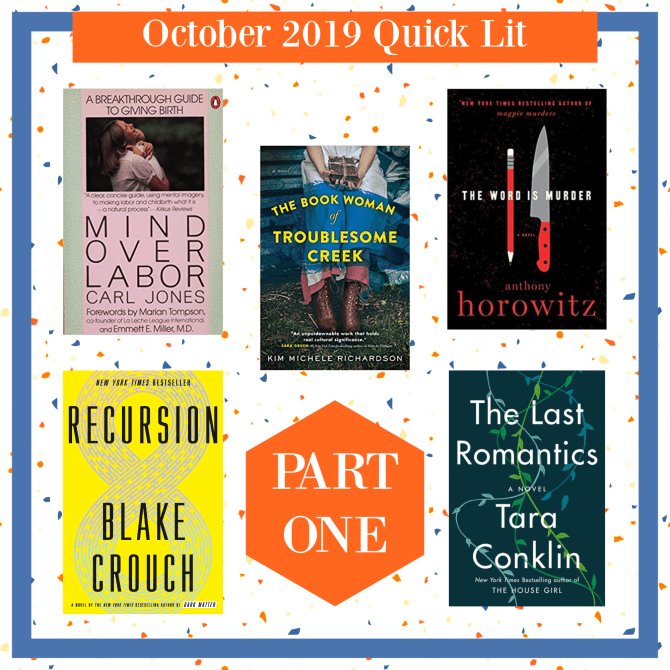
The Last Romantics, by Tara Conklin: In the year 2079, renowned poet Fiona Skinner—now 102 years old—is presenting in front of a live audience when she is asked about the inspiration behind her most iconic poem, leading her to share the story of her own life and that of her three siblings.
In the spring of 1971, Fiona’s father dies unexpectedly, leaving behind a wife and four children: protective 11-year-old Renee, sensitive Caroline, golden boy Joe, and Fiona, the baby, who is only four years old. Their father’s death and mother’s subsequent years of depression forge an impenetrable connection between the siblings, who remain connected through the decades despite family tragedies, poor decisions, diverging life paths, and even rifts within their siblinghood.
As Fiona reflects back on the highs and lows of the Skinner family, she paints a portrait of love and loss, longing and regret, loyalty and grief. The Skinner siblings are difficult to like, but their dynamic is warm, believable, and inspiring, and their story is conveyed through gorgeous prose and evocative imagery.
I’m a huge fan of family sagas, but I’ll admit that I didn’t enjoy this one as much as I expected to. Despite all that it has going for it, the story doesn’t come together in a way that I found satisfying; there is quite a bit of meandering and plot trajectories that didn’t end as I had hoped they would, and I couldn’t understand the massive importance placed on a particular character whose presence is a small blip in the overall story. (The siblings’ obsession with this character is completely out of line with their personalities, and their hunt for her seems to have been added to create unnecessary intrigue to an already engaging story.) I was also confused/distracted by the shifting points of view, as the story is presumably told from Fiona’s perspective, and I didn’t care for the anti-male sentiment that is prevalent throughout the book.
I can understand why this book is receiving such favorable reviews, but for me, it didn’t offer enough substance or heart to stand out within its genre. If you’re looking for a more engaging read with similar themes, I’d recommend picking up Ask Again, Yes, instead.
My Rating: 3.5 Stars.
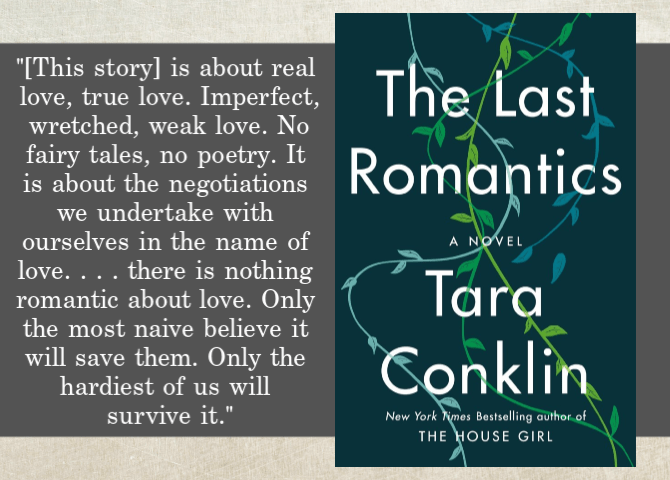
Recursion, by Blake Crouch: Neuroscientist Helena Smith has dedicated her life to creating a technology that will preserve an individual’s most precious memories, essentially allowing them to return to their past to re-experience life’s most important moments. Meanwhile, New York City police officer Barry Sutton is personally enduring the effects of a phenomenon known as False Memory Syndrome, a strange affliction that floods victims with memories of lives they have never lived.
Eventually, Helena and Barry cross paths and together they must face the consequences of Helena’s technology, which has not only affected the memories of billions of people, but changed the trajectory of history and altered mankind’s experience of past, present and future.
Just as he did with Dark Matter, Blake Crouch has crafted a novel that blends science fiction, thriller, and romance. He also offers fascinating insights into the concepts of memory, our perception of time, and the possibility of alternate realities. (The book introduced me to the “Mandela Effect”, which I have now spent far too much time reading about online. . .) Recursion touches on the science of these concepts without getting too heady (in fact, I would have liked a little more scientific explanation) and he manages to produce a story that is both entirely fantastic and utterly believable.
As much as I loved the book’s premise, I found the middle—with its constantly repeating timelines—tedious and too action-heavy. I wanted to spend some time getting to know our characters and become swept away by their love story, but the fast pace kept that from happening. That said, I LOVED the ending. . . I just wished we could have taken a different path to get there.
Recursion reminded me a lot of All Our Wrong Todays, which I liked more (possibly because I read it first). I wish I hadn’t read the two books so close together, as they have already started to blend together in my memory.
My Rating: 3.5 Stars. (I was tempted to round this up to 4 based purely on the Amor Towles cameo!)
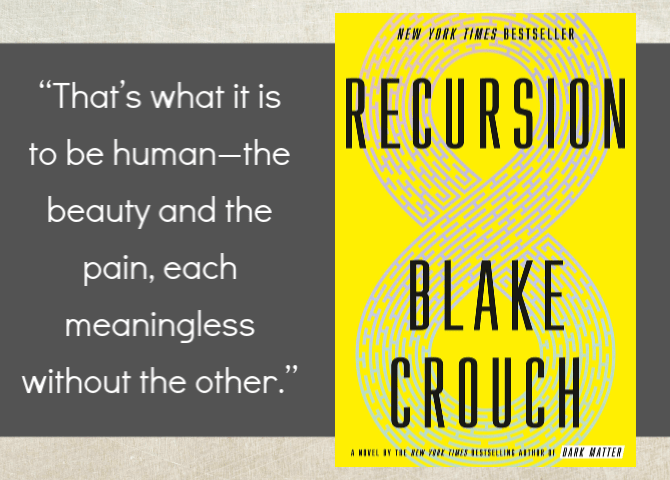
The Word is Murder, by Anthony Horowitz: On a bright spring morning, Diana Cowper—a middle-aged British socialite—walks into a funeral parlor to plan her own funeral. Just hours later, she is strangled in her home. Enter Daniel Hawthorne, the eccentric detective who is on the case. And documenting the investigation is Anthony Horowitz (yep, the author of this book) who has been drawn in against his will to serve as Watson to Hawthorne’s Holmes. Horowitz is annoyed by Hawthorne’s brusque manner, arrogance, and annoying knack for reading a room, yet he can’t stay away from the compelling mystery before them. As the duo investigates Diana Cowper’s death, they unveil past tragedies, become acquainted with her Hollywood actor son, and begin to see that there are more layers to her death than they could have imagined.
I love a good mystery, and this one is truly brilliant! Not only is the crime itself completely absorbing (replete with red herrings and plenty of fun twists), but the author’s inclusion of himself as a character is genius! We learn many true facts about Horowitz and his work as a writer, and he lets us into his thought process of recording Hawthorne’s story. I enjoyed the factual element layered over the fictional story and I was intrigued to learn more about the craft of mystery-writing from this unique angle. Though Hawthorne is presented as a real individual, his presence within the book prompts some intriguing thoughts about an author’s relationship to his characters, his decisions about what he will reveal in a story and what he will hold back, and how the writing of a book factors into the rest of an author’s life.
If you enjoy a good whodunit and appreciate unique storytelling, this book is for you!
My Rating: 4.5 Stars.
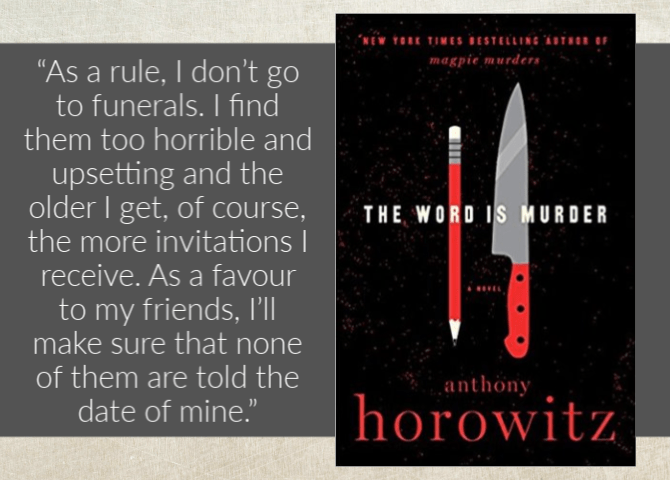
Mind Over Labor, by Carl Jones: I first read this book as part of the Bradley classes we took to prepare for my labor with Charleston, and I knew I wanted to revisit it prior to my labor with the twins. I hadn’t remembered much of the content, but I do recall enjoying/appreciating the book more with the first read. As with all parenting and pregnancy books, there was some content that worked for me and some that didn’t.
What I liked: the emphasis on the mind/body connection, especially relating to labor (I fully agree that this is extremely important and experienced it firsthand in my first labor); the detailed relaxation and imagery exercises (also proved helpful in my first labor and I have been relying on them again this pregnancy); the wholistic approach and explanation of why standard medical practices and techniques might not always be best for mom and baby; the invitation for women to ask questions and take control of our own birth experiences; and the emphasis on the vital role a husband plays in labor.
Now for what I didn’t love: the constant parallels drawn between labor and sex (for some women labor might be a sexual/orgasmic experience, but that hasn’t been the case for me); the minimizing of the pain experienced in labor (having gone through it, I know that labor isn’t simply uncomfortable, and found these descriptors misleading and potentially discouraging); the author’s lack of credentials and failure to include insight from true medical professionals; the strong anti-hospital/anti-medication vibe (just as I had trouble with Jillian Michaels’ refusal to acknowledge anywhere but a hospital as an appropriate place to deliver baby, I can’t get behind Jones’ emphasis that the only place a woman should give birth is in her home—both are valid options, with no one answer that is best for all women, and it is unfortunate that authors seem so adamantly opposed to validating birthing decisions that aren’t totally in line with the choices they would make for themselves).
I am very glad that I reread this book in preparation for the twins’ delivery. If you are interested in having a calm, natural childbirth—and are willing to accept some unconventional ideas (some have called this book “woo woo”)—I would recommend reading this book, but keep in mind that not all of the information will necessarily pertain to you.
My Rating: 3.5 Stars.
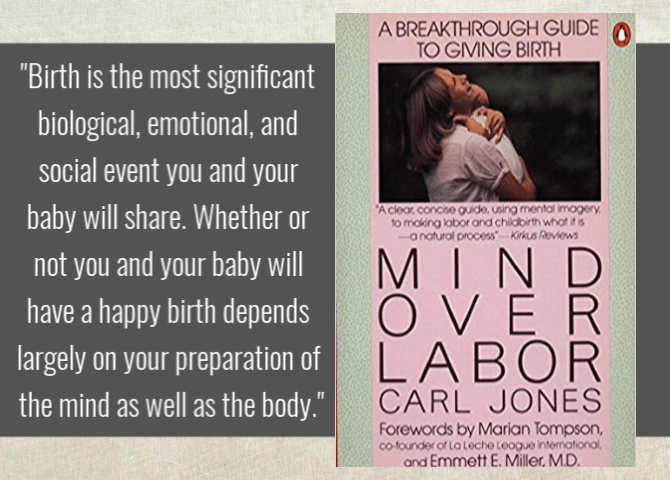
The Book Woman of Troublesome Creek, by Kim Michele Richardson: In 1936, Cussy Mary Carter is a traveling librarian in the town of Troublesome Creek, working under Roosevelt’s Kentucky Packhorse Library Project whose mission was to deliver books to remote regions in the Appalachian Mountains. Cussy is also the last of the blue-skinned people of Kentucky, and has experienced a lifetime of prejudice and cruelty due to the blue tint of her skin. Cussy (known to the mountain folk as Bluet) is passionate about her work of bringing the joy of books to her community, but along her dangerous route she witnesses unfathomable hardship and encounters painful suspicion from those who don’t like how she looks and distrust the books she has come to offer.
This novel offers a realistic look at two topics I’d known nothing about: the blue people of Kentucky (I actually googled this to determine whether or not it was real—it was!) and the Library Project of the 1930s. It was heartbreaking yet eye-opening to witness life in Appalachia during this time period, and I was both surprised and saddened by the lack of education and overt prejudice that were commonplace among these mountain people. I appreciated this book’s celebration of literacy and admired the strong, confident character of Cussy.
That said, this was a slow read for me that left me wanting more from both the dialogue and the story. Even though I liked the ending, it wasn’t until the last few chapters that I felt invested in what would happen to Cussy. The only explanation for my lack of enthusiasm for this book that seemingly checked so many of my boxes was that it was too much “historical” and not enough “fiction.” I listened to the audio, and with its slow pace and numerous characters, perhaps this is a book that would have been better to read with my eyes. I do think the material would make for a wonderful television series.
My Rating: 3.5 Stars.
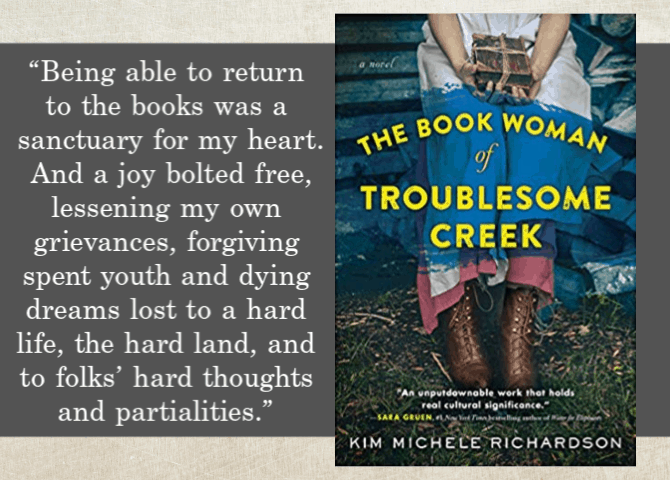
Have you read any of these titles? What did you think?